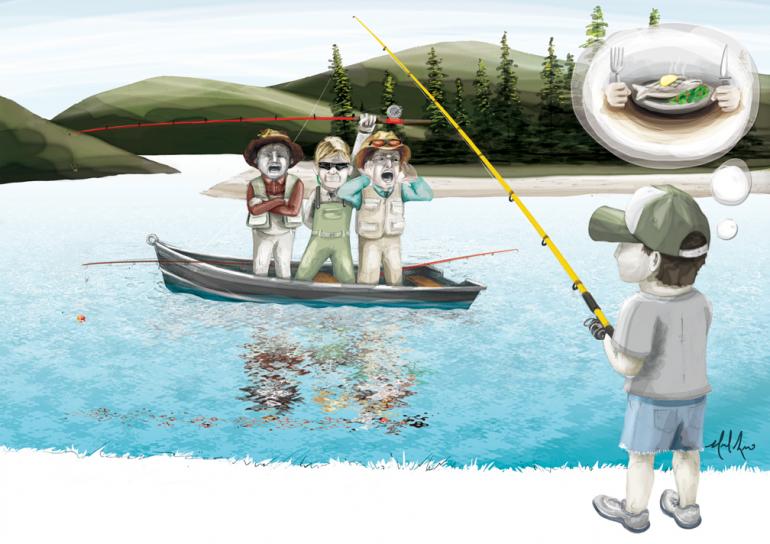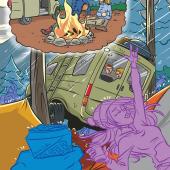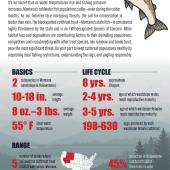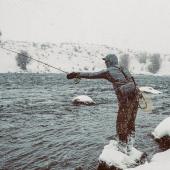Fish Food
I am not a disciple of Norman Maclean. To say it another way: I’m not a fly fisherman. Fly fishing is fine and dandy, but I’m more of an eater than a fisher. Fishing is something I do to provide myself with juicy, succulent meat, and that’s pretty much where the romance ends. I can appreciate a beautiful evening on the riverbank, but I’m perfectly happy reeling in my legal quota on a spincast rig; on a bobber; on troll. Whatever. Just get that flaky flesh to my lips.
And you know what? In addition to the delicious trout that end up in my pan, I catch endless amounts of shit from some self-professed “real” anglers who, strangely, protest ever keeping a fish. In their strict catch-and-release worldview, prevailing attitudes can be ironically far from live and let live.
On the bank of the Yellowstone, I was once verbally assaulted by a group of obnoxious, Orvis-bedecked fly fishers in a passing driftboat for failing to “respect” the river’s trout; I was flipping a small spoon on an ultralight spin rig and had two small (legal) “keepers” cleaned and chilling in the water next to me. They brashly implied (yelled across the river, actually) that to keep a fish is to dishonor it, and that spincasting wasn’t really fishing at all.
I was with a friend that day—a born-and-raised Paradise Valley native, if it matters—who was also using a spinning rod. Being a rather rash and combative individual, he threatened to wade out and teach them a lesson about respect, but fortune found him too busy reeling in another perfectly pan-sized rainbow. The pretentious boatload of fishermen had nothing on their lines, but somehow they floated away with hubris intact.
I won’t ever claim to be a passionate angler. I don’t know squat about fish, except that they are tasty and not especially smart. And frankly, that’s all I need to know to set the table and be happy. But when fellow fishermen look down their noses at me for keeping and eating what I catch, it makes me want to beat them with a willow creel full of bricks.
Nothing is more sustainable than consuming plants, animals and, yes, fish acquired within 50 miles of your home. And fortunately for Bozemanites, there are approximately a bazillion legally edible fish within that local radius. I’m not saying that we should dynamite the rivers to fill our pantries, but for people in southwest Montana, it makes a lot more sense ecologically (not to mention just plain old logically) to harvest local fish than to import color-added, farm-raised, steroid-enhanced trout from Korea.
I’ll also argue that reeling in a fish as quickly as possible, knocking its head over a rock, and consuming it eagerly that night is far more merciful and respectful than “playing” a fish to the point of total exhaustion, then posing with it for photos in the dusky Montana alpenglow before tossing it back into a strong current to fend for itself. In this respect, catch-and-release anglers are merely tormenting fish for fun. I’d like to run a barbed hook through their smug lips, drag them through some rapids for a half hour, take some photos of their mortal defeat with a hearty thumbs-up, and then see how “respected” they feel. Hypocrisy, like trout, is best served fresh, with a spritz of something bitter.
My point with all of this—indeed, there IS a point—is simply that I want to be left alone to enjoy my dinner. That’s all. If you use a different tool to tempt your trout, that’s fine with me. If you throw every last one of them back, that’s great, and good for you. If you are an example of stewardship and sporting ideals, I’m behind you 100%. But claiming that it’s wrong for anyone to eat what they legally catch is narrow-minded at best, elitist on average, and completely ignorant at worst. I believe in the value of catch-and-release, but it’s vitally important to remember what it really means to do so: live and let live. Or, in my case, live and let eat.













